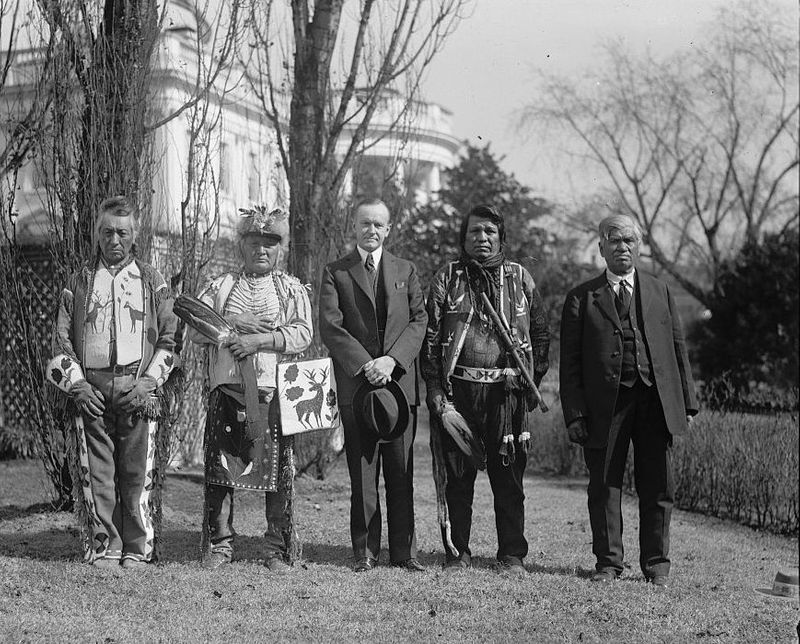Today In History: Indian Citizenship Act

On June 2nd, 1924, the United States Congress passed the Indian Citizenship Act which granted citizenship to all Native Americans born within the territorial limits of the country. However, associated privileges, including the right to vote, were determined by state law and took decades to advance. The granting of citizenship applied to roughly 125,000 of the 300,000 indigenous people in the United States, where roughly 125 million people lived at the time, and itself was controversial among tribes; some supported the Act to establish and protect identity with integration, while others wanted to better preserve distinct Native American identity and rights to land.
In 1830 the forced displacement by the United States government of self-governing tribes of Native Americans from their ancestral homelands in the eastern United States to lands west of the Mississippi River led to the brutal deaths of thousands, many Cherokee. The devastating removal of roughly 60,000 indigenous peoples from the Cherokee, Muscogee, Seminole, Chickasaw, Choctaw, Ponca and Ho-Chunk/Winnebago nations, was known as the "The Trail of Tears"; it comprised an arduous 1,200 mile journey, with forced starvation, and it lasted for twenty years.
Today roughly 56 million acres of land are designated Native American reservations, although most indigenous peoples live off reservations in cities or suburbs. Only 2% of the entire United States population is Native American, with 574 tribes recognized by the United States government. The highest percentages of Native Americans live in Alaska, Oklahoma, New Mexico, and South Dakota.
The following articles are drawn from Proquest Historical Newspapers, which informs and inspires classroom teaching and learning.
- All Native Indians Are Made Citizens: Bill Signed By Coolidge Does Not Affect Tribal Rights. (1924, Jun 12). Los Angeles Times (1923-1995)
- Harvier, E. (1924, Sep 07). Indians to Vote Next Election Day: New Law Enfranchises Those Who Are Of Age and Otherwise Qualified. New York Times (1923-)
- Wallen, T.C. (1927, Aug 18). Indians Hear Mr. Coolidge Pledge Help. New York Herald Tribune (1926-1962)
- Folliard, E.T. (1928, Aug 26). Balance Of Power Is Held By Red Men In Many States. The Washington Post (1923-1954)
- Schroeder, R. C. (1972, Nov 19). The Indian Is Coming On Strong. The Sun (1837-)
- Smith, J. S. (1974, Nov 21). 'Why Indians Have Nothing To Lose'. Los Angeles Times (1923-1995)
- Indians Declared Citizens in 1924. (1975, Oct 15). The Hartford Courant (1923-)
- Marshall, B.K. (1990, Nov 29). Culture Clash Landfill Plan Sparks Indian Protest. The Christian Science Monitor (1908-)
- Native American Indians Get Out the Vote 'Rez Style'. (2004, Oct 09). People's Weekly World (1990-2013)
- Turkewitz, J. (2018, Jan 04). Native Americans Pushing To Increase Sway At Polls: 'Historic Moment' For Native Americans. New York Times (1923-)
Tips:
- Ellinghaus, Katherine. Blood Will Tell: Native Americans and Assimilation Policy. Lincoln, Nebraska: University of Nebraska, 2017. e-book
- Fixico, Donald Lee. Bureau of Indian Affairs. Santa Barbara, Calif: Greenwood, 2012. e-book
- Rogers, Audrey Green. Trail of Tears. Amawalk, NY: Jackdaw Publications, 2005. CURR E99.C5 T73 2005
- Warren, Kim Cary. The Quest for Citizenship African American and Native American Education in Kansas, 1880-1935. Chapel Hill: University of North Carolina Press, 2010. e-book
- Wilkins, Andrea. Fostering State-Tribal Collaboration: an Indian Law Primer. Lanham, Maryland: Rowman & Littlefield, 2016. e-book
- Read the blog post, Archival Exercises: Examining Marginalized Histories
Images:
- Takina Indians at White House, 1925, Courtesy of GetArchive
- Special News Slide, Courtesy of the Gottesman Libraries (forthcoming)
**
Need to keep current, look to the past, teach a topic? The Everett Cafe features daily postings of news from around the world, and also promotes awareness of historical events from an educational context. Be sure to check additional Cafe News postings on the library blog.

